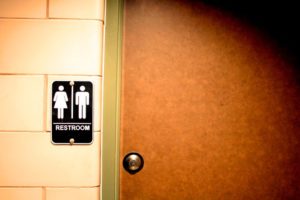
RALEIGH, N.C. — Republican lawmakers in North Carolina announced on Wednesday night that they have reached a compromise with Democratic Gov. Roy Cooper to repeal the state’s bathroom bill while still protecting bodily privacy. The controversial announcement has pleased some and concerned others who believe that there should be no compromises.
“Compromise requires give and take from all sides, and we are pleased this proposal fully protects bathroom safety and privacy,” majority leaders Tim Moore and Phil Berger said in a statement.
H.B. 142 would repeal H.B. 2 and replace it with new language that gives power to the state to regulate restroom use. Berger says that the move would still protect “privacy in bathrooms and shower facilities by leaving regulation of multi-occupancy facilities to the state, returning to the status quo prior to passage of Charlotte’s bathroom ordinance.”
“State agencies, boards, offices, departments, institutions, branches of government, including the University of North Carolina and the North Carolina Community College System, and political subdivisions of the state, including local boards of education, are preempted from regulation of access to multiple occupancy restrooms, showers, or changing facilities, except in accordance with an act of the General Assembly,” the proposal reads.
The bill also prohibits local municipalities from passing restroom regulations until 2020, as the Charlotte city council had done, which prompted the passage of H.B. 2 in the first place. Berger says that this allows time for the matter to play out in the federal government.
As previously reported, H.B. 2 required those who identify as the opposite sex to present their birth certificate before using public restrooms that correlate with their “gender identity.” Then-Gov. Pat McCrory defended the law as being reasonable since transgenders could have their birth certificate changed and would then be permitted to use their preferred restroom.
“Businesses are not limited by this bill. Private individuals, companies and universities can adopt new or keep existing nondiscrimination policies,” his office also noted. “[I]f a privately-owned sporting facility wants to allow attendees of sporting events to use the restroom of their choice, or install unisex bathrooms, they can. The law neither requires nor prohibits them from doing so.”
However, corporations such as PayPal still pulled out of plans for expansion in the state as a form of protest. Nearly 70 other corporations, including Apple, Dropbox, eBay, IBM, Microsoft, NIKE, Morgan Stanley, Etsy, Levi Strauss, American Airlines, Hilton Worldwide and Marriott International, also joined an amicus brief in support of having the law struck down in court.
Cooper, who refused to defend the law in court when serving as attorney general, blasted the statute as being a “stain on the reputation of our great state.” An effort to repeal the regulation failed in December.
But Cooper expressed support for H.B. 142’s compromise on Wednesday, which was made following reported closed-door meetings.
“It’s not a perfect deal, but it repeals House Bill 2 and begins to repair our reputation,” he said.
The North Carolina Chamber of Commerce also backed the move.
“The North Carolina Chamber thanks House and Senate leadership and the Governor for coming together on a bipartisan basis to find a solution, we encourage members of the House and Senate to support House Bill 142,” President Lew Ebert said in a statement.
However, transgender advocacy groups repudiated the proposed bill, opining that it does not go far enough.
“This ‘deal” does NOT repeal #HB2. It’s simply another version of H.B. 2 dressed up in a way desperate lawmakers hope will save state’s economy,” Tweeted Human Rights Campaign President Chad Griffin. “Any ally of the LGBTQ community cannot support this new version of #HB2. There will be political consequences for those who do, Democrat and Republican.”
Christian groups also rejected the move, but for different reasons. The North Carolina Family Policy Council and the North Carolina Values Coalition believe legislators should retain H.B. 2 and not compromise.
“This repeal of H.B. 2 will not solve anything!” the Coalition said in a statement. “It will never be good public policy to allow men into women’s and little girl’s bathrooms and showers. H. B. 2 guarantees that won’t happen, and it provides reasonable accommodation for a small minority of transgender people.”
The group opined that lawmakers were “scurrying to make concessions just to appease the NCAA (National Collegiate Athletic Association)” and that “[i]f the State succumbs to this new form of economic and corporate extortion, North Carolina will be establishing a precedent and illustrating a template for future corporate extortion efforts on any number of legislative issues.”
The bill cleared a Senate committee on Thursday morning and will therefore proceed to the full Senate. It could be voted on in both houses by the end of the day and be sent to Cooper’s desk.
Become a Christian News Network Supporter...


